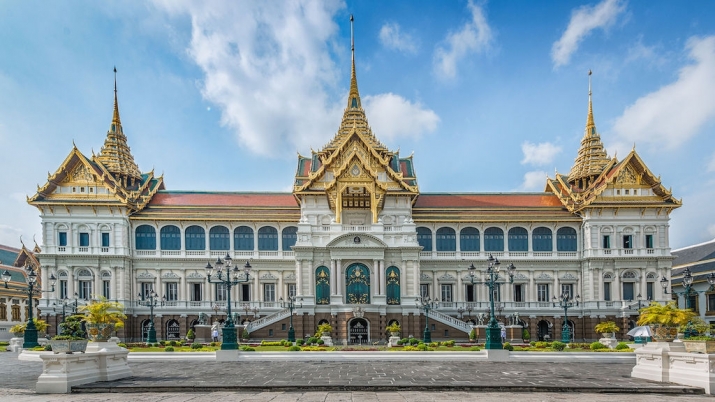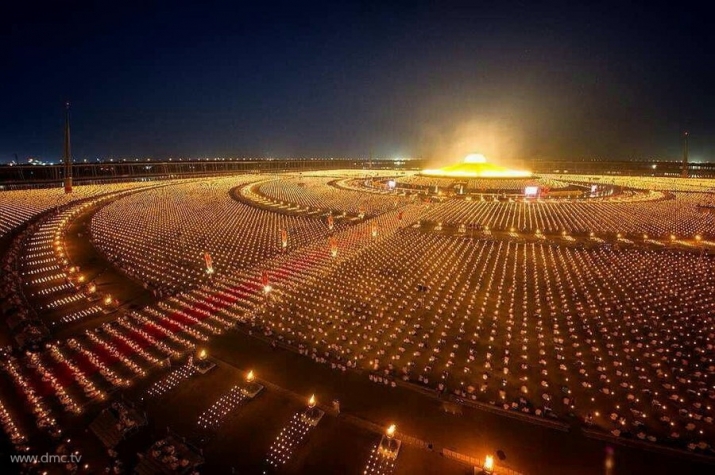NEWS
Sangha Wars: Conflict between Dhammakaya and Buddhist Establishment Spills over into Thai Politics
 Chakri Maha Prasat Building in Bangkok's Grand Palace, which is used for Thai official events. From Andy Marchand
Chakri Maha Prasat Building in Bangkok's Grand Palace, which is used for Thai official events. From Andy MarchandAn ecclesiastical dispute in Thailand is mirroring a major conflict between Thailand’s two most important political factions.
The controversy over the nomination of Thailand’s supreme patriarch is commonly framed as an internal conflict over nominee Somdet Phra Maha Ratchamangalacharn’s ties to the sect Dhammakaya. The stakes are actually much higher. In an incisive report published in The Manila Times on 8 March, the geopolitics firm Stratfor Global Intelligence warned, “The ruling military junta’s decline in legitimacy will push it to rely more heavily on support from conservative Buddhist factions,” whilst, “The fringe Dhammakaya Buddhist sect will shield itself from pressure by exploiting its ties to powerful opposition leader Thaksin Shinawatra—and vice versa.”
Dhammakaya has proved to be a thorn in the religious establishment’s side for years, thanks to its immense popularity among the professional and political classes of Thailand. Its quasi-prosperity gospel teaching of bestowing spiritual merit in return for financial donations has granted it vast wealth, along with accusations of decadence and corruption. Dhammachayo, the founder leader of the group, is currently under investigation for embezzling the temple’s donation funds. Activist monk Phra Buddha Isara, who has ties to the military, told Channel NewsAsia: “For the Thai Buddhist community, there has never been a supreme patriarch nominee with such a questionable background. If we let Somdet Chuang become the supreme patriarch, then we would allow the Dhammakaya sect to dominate Thai Buddhism.”
The burgeoning materialism and boom-and-bust economic growth since the 1980s assisted not only the rise of Dhammakaya, but also populist and pro-rural politician Thaksin Shinawatra, which the royalist establishment despises as the embodiment of the decay of traditional society. The Buddhist elite and royalists’ suspicion of the ties and coordination between Dhammakaya and Thaksin grew for the next few decades, culminating not only in Thaksin’s ousting from his prime ministership and from the country in September 2006, but also in his sister and ex-PM Yingluck Shinawatra’s arrest on 23 May 2014 in the wake of the pro-monarchy military coup against her government.
 Wat Dhammakaya, center of the Dhammakaya movement. From dmc.tv
Wat Dhammakaya, center of the Dhammakaya movement. From dmc.tvThe Thaksin siblings might not hold formal political office, but in Dhammakaya lies the untapped mob power that the government sees as one of their clan’s most terrifying weapons. In January 2015, “. . . during an investigation into its connections to a massive money-laundering scheme . . . more than 1,000 Dhammakaya monks marched unannounced through Bangkok, paralyzing rush hour traffic across the capital—a move borrowed from the Red Shirt playbook,” noted Stratfor, referencing the pro-Thaksin protests in 2010.
According to Stratfor, the military junta now ruling Thailand is under pressure from the royalists to hit the Thaksin faction hard. There are many reasons for this haste: “Since the 2014 coup, the junta’s strategy has essentially been to hold power as long as possible—at minimum, until the looming royal succession process is settled [the king is extremely unwell]—while seeking to sideline Thaksin by further dismantling his patronage network and encouraging factions from his Pheu Thai party to move on without him. Meanwhile, Thaksin’s core strategy has been to deny the junta any pretext to further delay elections, which his allies would still almost assuredly win, while allowing the current rulers to bear the brunt of Thailand’s economic and political woes.” These competing strategies were played out on 15 February when monks supporting Somdet scuffled with military officers, accusing the government of interfering in religious affairs.
Arguably, the most dramatic moves were made by Phra Buddha Isara when he argued that Buddhism should be enshrined as a state religion, which would allow legislation to curtail Dhammakaya’s influence on the sangha. He also called for acting prime minister Prayut Chan-o-cha to stay in power for another 10 years and constitutionally curb the next civilian government’s powers. But the newest draft charter was extremely unpopular. The longer the junta stays in power, the less traction it has with moderates and liberals. The more support it loses, the more hyper-conservative forces it relies on to cobble together legitimacy. Watch this space for how the new king and new supreme patriarch will shake the political battlefield.
See more
Buddhist sects’ feuding could grow into proxy war of Thai political camps (The Manila Times)
Thai Monks Scuffle with Soldiers at Monastic Leadership Rally (Buddhistdoor Global)
Dhammakaya saga threatens to deepen feud in Thai Buddhism (Channel NewsAsia)
Thai Buddhist Scholar Cautions Against Enshrining Buddhism as State Religion (Buddhistdoor Global)














